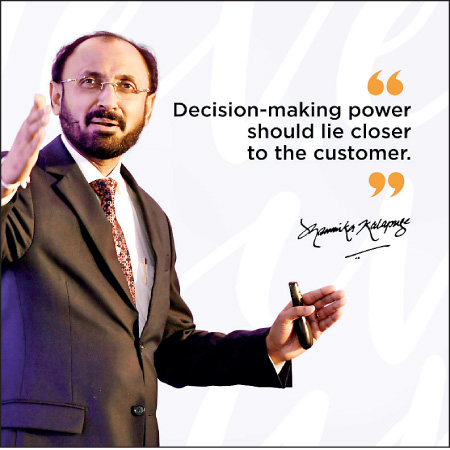Wednesday Feb 18, 2026
Wednesday Feb 18, 2026
Wednesday, 9 October 2024 00:01 - - {{hitsCtrl.values.hits}}
 Providing an outstanding customer experience has become the foundation of any successful business today. Customers demand solutions that fit their needs, delivered with convenience and speed. Equally important, they expect these solutions to come with a ‘human touch’ and consideration for their future well-being. Research shows that nearly half of customers will abandon a brand after just one bad experience. This is because today’s customers have vast options, and alternatives are just a click away. Nevertheless, over 85% of customers are willing to pay more for a better experience and build loyalty to such brands.
Providing an outstanding customer experience has become the foundation of any successful business today. Customers demand solutions that fit their needs, delivered with convenience and speed. Equally important, they expect these solutions to come with a ‘human touch’ and consideration for their future well-being. Research shows that nearly half of customers will abandon a brand after just one bad experience. This is because today’s customers have vast options, and alternatives are just a click away. Nevertheless, over 85% of customers are willing to pay more for a better experience and build loyalty to such brands.
Creating solutions based on research and anticipating future customer needs is the ‘science’ of customer experience. In designing these solutions, businesses must ask: “How sensitive and responsive are we to the customer’s exact needs and environmental factors?” “Are we getting our fundamentals right in providing solutions?” “What will the customer truly value?” These are critical considerations for any business aiming to provide meaningful customer experiences.
In addition, businesses must explore the value they can create for customers through ‘digitisation.’ By leveraging data from Sales, Marketing, and Customer Service departments, businesses can identify customer needs through data-driven decision-making. Beyond that, technology can be used to offer ‘digital convenience,’ enhancing customer experiences through seamless and efficient interactions.
 However, customer experience design goes beyond material or conceptual solutions. Customers choose a product or a service necessarily not only for its technical characteristics, such as quality of the product, price or availability but also for the relationship they build through experience with the company. Customer experiences are shaped in the minds of customers, and therefore businesses must consider not only the rational aspects of solutions but also the emotional components. Recognising that human beings have feelings and that managing these emotions are crucial to business success. Therefore, in the customer’s journey, how a business treats individuals and fosters emotional connections is an ‘art.’ Moreover, when businesses operate with a genuine concern for the customer’s well-being, they deepen customer engagement.
However, customer experience design goes beyond material or conceptual solutions. Customers choose a product or a service necessarily not only for its technical characteristics, such as quality of the product, price or availability but also for the relationship they build through experience with the company. Customer experiences are shaped in the minds of customers, and therefore businesses must consider not only the rational aspects of solutions but also the emotional components. Recognising that human beings have feelings and that managing these emotions are crucial to business success. Therefore, in the customer’s journey, how a business treats individuals and fosters emotional connections is an ‘art.’ Moreover, when businesses operate with a genuine concern for the customer’s well-being, they deepen customer engagement.
For example, Toyota focuses on both ‘technological advancement’ and ‘emotional connection’ in creating customer experiences. Similarly, Steve Jobs envisioned products that combined grace and elegance with functionality—an intersection of technology and art. This vision drove him throughout his career, producing something truly special.
Creating an excellent customer experience is about having the right product, an effective delivery mechanism, winning the customer’s heart, ensuring their well-being, and fostering long-term loyalty. Achieving this requires establishing the right organisational culture, where everyone consistently strives to create a unique and valuable experience appreciated by all stakeholders. Establishing this culture is both a ‘science’ and an ‘art,’ requiring awareness and commitment from the entire organisation. Ultimately, this approach builds trust, which enhances both customer loyalty and employee satisfaction.
(The writer is a sought-after ‘Customer Experience’ specialist in Sri Lanka. Over the last 28 years he has conducted nearly 3,300 inspirational and educational programs for over 800 organisations in 11 countries. His work can be seen at www.dhammikakalapuge.com.)